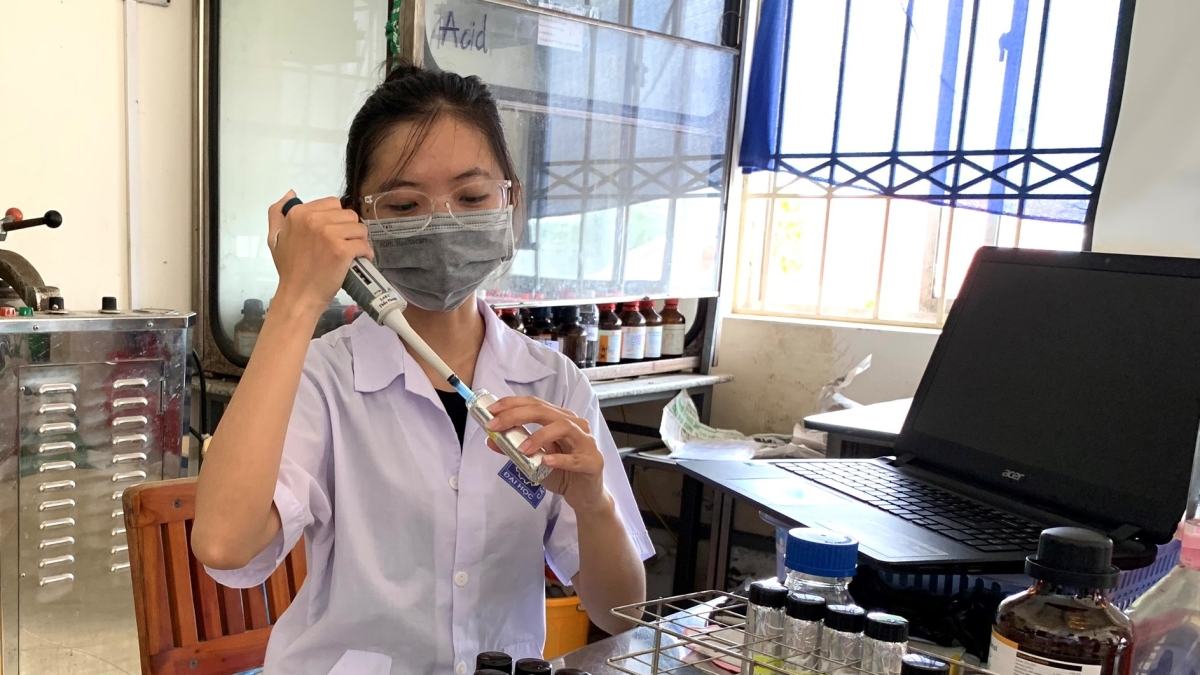Vuong Thi Ngoc Tuyet grew up in the Mekong Delta's largest city, Can Tho, Vietnam. Throughout her childhood, she had an energetic curiosity for science. Raised in a family where women only graduated high school, she convinced her skeptical parents to let her join Can Tho University's challenging chemical engineering program.
"No woman in my family had a chance to go to university," Tuyet said. "I wanted to do something different. I wanted to change people's perceptions about women in STEM. That was how I convinced my parents to let me attend university."
Tuyet's journey from a shy first-generation university student to a confident young engineer was aided by her participation in Engineering Projects in Community Service (EPICS), an award-winning social entrepreneurship program supported by USAID BUILD-IT and Arizona State University.
EPICS is a transformational applied project program that embodies ASU's inclusive innovation and civic participation ethos. Through ASU's work supporting equitable engineering education in Vietnam, EPICS has transformed the lives of thousands of bright Vietnamese students.
Video by USAID BUILD-IT and the Mekong-U.S. Partnership
As one of four female students in her cohort, Tuyet was intimidated by her new school.
"When I first joined the university, I was shy and lost. As a minority, I didn't speak up or voice my opinions — even when I needed something," she said. Tuyet's mentors encouraged her to join EPICS.
The program's 30% female enrollment minimum and emphasis on community-driven innovation made Tuyet feel welcome and her work feel meaningful. During EPICS, Tuyet met many like-minded, talented young women. She worked in teams with other undergraduate students to design, build and deploy solutions to solve problems in their community. In her first year, Tuyet and two other young women invented a candy made of rice bran to help diabetic patients manage their diets. She designed this candy to inspire her diabetic mother.
Then, she led a team to build a safe, high-capacity, easy-to-use roller pesticide sprayer for farmers to roll through orchards instead of carrying on their backs. This invention won the team the first prize at the nationwide EPICS final showcase. Tuyet's family was thrilled to see her win the top award in engineering. They now trusted that a STEM education would guide their daughter to success. Tuyet's journey even inspired her younger sister to join STEM courses.
Tuyet said she draws on her experiences as a woman to develop her team's innovations.
"I can draw inspiration from being a woman," she said. "I can set my mind to solve the problems that women are facing every day."
Tuyet will soon graduate from Can Tho University and pursue a career in sustainable fuel.
"My dream is to work as an engineer at an oil and gas company, but I heard they only hire women for office work. I will apply anyway. I am ready to show everyone that I can do anything my male colleagues can."
USAID BUILD-IT supports Tuyet and all EPICS students to apply their engineering know-how for social good. The USAID BUILD-IT Alliance is mission-driven to support top universities, like Can Tho University, to integrate project-based learning into their curricula. Arizona State University's Ira A. Fulton Schools of Engineering leads the alliance and manages EPICS in Vietnam.
In spring 2019, a cohort of ASU EPICS students worked alongside Vietnamese students for an international engineering project. In 2021, Can Tho University will become one of Vietnam's first universities to adopt EPICS into a course. Thanks to Tuyet and her peers' hard work, Vietnamese young people can see that having a woman on an engineering team is an asset and a force for good in their communities and across the country.
Top photo: Vuong Thi Ngoc Tuyet works in the laboratory. Courtesy EPICS.
More Science and technology

Lucy's lasting legacy: Donald Johanson reflects on the discovery of a lifetime
Fifty years ago, in the dusty hills of Hadar, Ethiopia, a young paleoanthropologist, Donald Johanson, discovered what would become one of the most famous fossil skeletons of our lifetime — the 3.2…

ASU and Deca Technologies selected to lead $100M SHIELD USA project to strengthen U.S. semiconductor packaging capabilities
The National Institute of Standards and Technology — part of the U.S. Department of Commerce — announced today that it plans to award as much as $100 million to Arizona State University and Deca…

From food crops to cancer clinics: Lessons in extermination resistance
Just as crop-devouring insects evolve to resist pesticides, cancer cells can increase their lethality by developing resistance to treatment. In fact, most deaths from cancer are caused by the…
